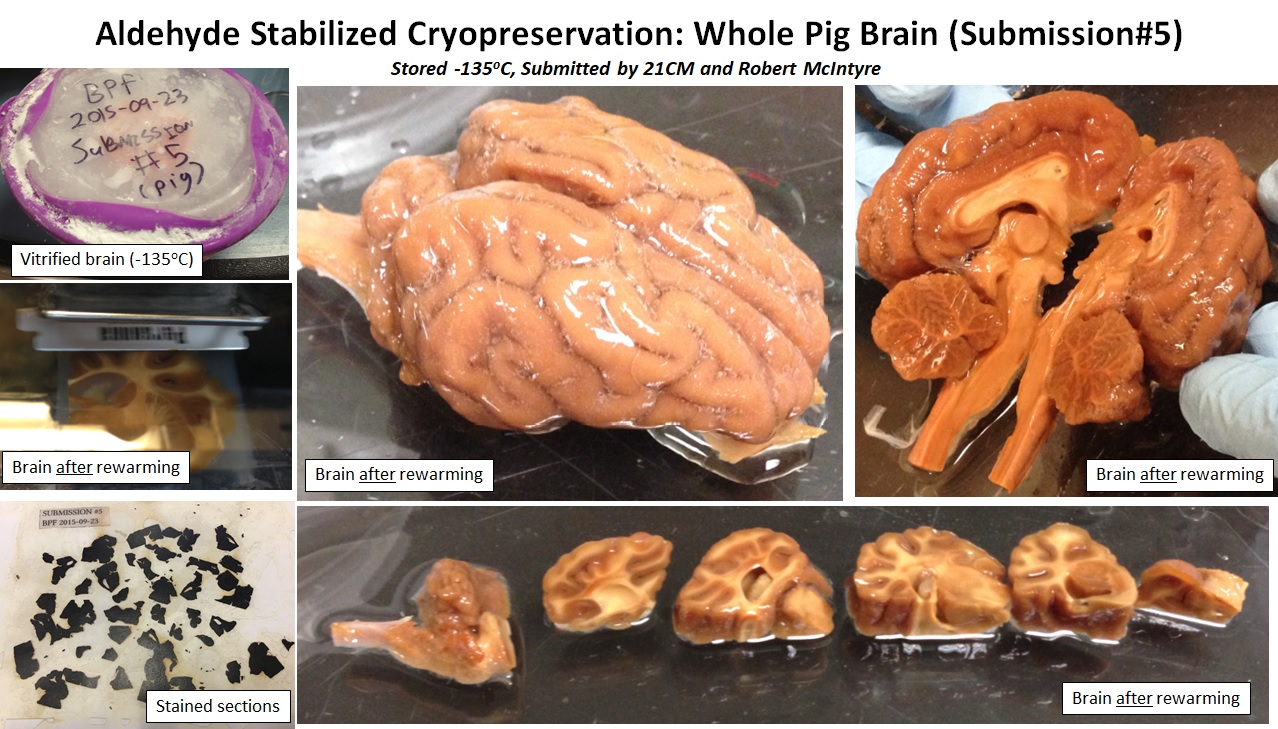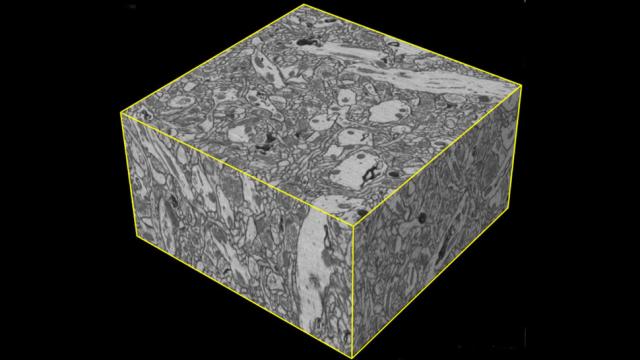3D representation of a brain slice following ASC preservation.
A prominent research lab at MIT has terminated its relationship with Nectome, a new startup with the stated mission of preserving human brains such that they can be digitised and uploaded into a computer in the future, effectively bringing the dead back to life. But while MIT has chosen to distance itself from the for-profit company, it hasn’t completely dismissed the futuristic prospect.
For MIT researcher Stuart McIntyre, the future is going to be a tougher sell than he imagined.
All seemed well last month, as McIntyre’s new brain-preservation technology, a method called Aldehyde-Stabilised Cryopreservation (ASC), won him and his 21st Century Medicine partners the lucrative $US80,000 Large Mammal Brain Preservation Prize. Three years ago he used a similar “vitrifixation” technique to preserve a rabbit brain, but using a scaled-up version, McIntyre and his colleagues showed it was possible to preserve a much larger brain, namely one belonging to a pig (you can learn more about ASC here, here, and here, but ASC essentially uses a complex chemical mixture to “fix” the contents of a brain in place prior to cryopreservation).
It was around this time that McIntyre, along with business partner Michael McCanna, decided to take vitrifixation to the next level in the form of a commercial venture called Nectome – a startup with the lofty mission of preserving human brains for eventual “reanimation” at some point in the far future. By preserving the brain’s contents (including memories) in such exquisite detail, and by limiting damage, it’s thought – at least in theory – that a digital version of a person might eventually be created, allowing life to continue.

Slides showing an ASC-preserved pig brain.
Totally transhumanistic stuff, to be sure, but Nectome was awarded a National Institutes of Mental Health (NIMH) small business grant, with MIT’s Synthetic Neurobiology Group, led by Ed Boyden, getting a subcontract. Boyden’s group was to combine elements of Nectome’s technology with its own efforts to better visualise brain circuits, and work on things like brain mapping, drug discovery, and brain preservation for future research. MIT’s involvement had to do with basic research and science, having no financial or operational affiliation with Nectome. Regardless, Boyden’s group decided this week to part ways with the startup.
“Upon consideration of the scientific premises underlying the company’s commercial plans, as well as certain public statements that the company has made, MIT has informed Nectome of its intent to terminate the subcontract between MIT and Nectome in accordance with the terms of their agreement,” states an MIT Media Lab press release put out on April 3. “Neuroscience has not sufficiently advanced to the point where we know whether any brain preservation method is powerful enough to preserve all the different kinds of biomolecules related to memory and the mind. It is also not known whether it is possible to recreate a person’s consciousness.”
The MIT lab, it would appear, wanted to have nothing to do with a company that was making claims such as this:
If memories can truly be preserved by a sufficiently good brain banking technique, we believe that within the century it could become feasible to digitize your preserved brain and use that information to recreate your mind.
It didn’t help that Nectome conducted a marketing survey and added over two dozen people to their waiting list. Also, the the company began to make inquiries into California’s End of Life Option Act, which makes doctor-assisted death permissible for terminally ill patients. The press ran with the story, saying Nectome is pitching a mind-uploading service that’s “100 per cent fatal,” and that to use its services customers will have to kill themselves first.
But in an email to Gizmodo, McIntyre made it clear that Necotome is primarily a research company, and that it has no intentions of preserving anyone’s brain anytime soon. It may be a classic case of back-peddling, but the startup is now having to clarify its message and intent.
“We appreciate the help which MIT has given us, understand their choice, and wish them the best. As alums, we’re big fans of MIT, and we hope that we can collaborate again in the future,” wrote McIntyre. “It’s important to remember that we’re a young neuroscience research company, still in the research phase of building a way to preserve memories. There’s a lot of interest in what this technology will look like in the future, but regardless of the headlines, it’s important to know that we do not currently offer clinical brain preservation, nor do we plan to offer it in the near future.”
He said brain preservation technology could yield tremendous benefits for society, but only if it’s developed with the participation of the neuroscience and medical ethics communities. “Our early supporters have expressed their support for the eventual development of a memory-preservation technique through refundable deposits,” he said. “Our early supporters want to live long, healthy lives, creating the very memories that they hope can one day be preserved.”
That said, it’s clear that a tension is emerging among researchers who are on the cutting edge of (arguably) super-futuristic life extending technologies, and the scientific establishment.
Aschwin de Wolf, the editor of Cryonics Magazine and CEO for Advanced Neural Biosciences, says the honeymoon period between advocates of vitrifixation and mainstream scientists appears to be even shorter lived than that of “traditional” cryonics advocates and mainstream scientists. The problem, as he sees it, is that the goalposts for bio-preservation technologies keep being moved.
“It is not really clear what critics are wanting to see right now, and what kind of information they think is still being erased by either chemical fixation or vitrification [the technique used in cryonics],” deWolf told Gizmodo. “Requiring a full understanding of the (molecular) nature of memory as a precondition of offering cryonics technologies is setting the bar even higher than for other medical procedures that involve the brain, such as brain surgery performed during circulatory hypothermic arrest.” During this form of surgery, the body is cooled to temperatures below 20 degrees celcius while blood circulation and brain function are stopped for up to a full hour.
Kenneth Hayworth, a senior scientist at the Howard Hughes Medical Institute’s Janelia Farm Research Campus and the president of the Brain Preservation Foundation, said MIT’s response was reasonable given the recent negative media surrounding Nectome, and given that the startup appeared to be using its grant relationship with MIT to boost its own credibility, or at least that’s how it appeared to Hayworth based on press reports.
“I must point out however that Nectome appears to me to be ‘playing by the rules’,” Hayworth told Gizmodo. “It has not performed brain preservation on anyone and it has not promised services to anyone… it simply plans on conducting more research to be ‘reviewed by both the medical and scientific community’ and plans to discuss process issues with medical ethicists when appropriate. It is clear in its intent to develop ASC into a medical procedure that can be offered to terminally ill patients who, like me, believe that future revival by mind uploading may be both possible and desirable. This is a minority view to be sure, but one that I believe should be respected and protected within the United States especially since it is a view grounded in science and represents a way for a terminal patient that loves life to continue fighting for it. I, for one, am looking forward to a vigorous debate over the coming years as more and more evidence is brought forward regarding ASC’s ability to preserve the structural and molecular information in the brain.”
Hayworth advised McIntyre to continue his research into ASC in an academic setting instead of attempting to raise research money as part of a for-profit company, despite the fact that raising investment capital for developing potential medical procedures is something that frequently happens in mainstream medicine. Consequently, Hayworth is understandably concerned that MIT’s withdrawal from this research is a signal to other neuroscientists that this area of research is somehow tainted. “On a positive note, however, the text of MIT’s response seemed carefully constructed to recognise, and to avoid denigrating, the emerging field of brain preservation.”
Indeed, the language in the MIT press release was surprisingly upbeat, saying that while “we do not know the exact set of molecules required, we cannot say whether a given brain preservation technique is sufficient to preserve all the biomolecular detail required to preserve memories and other information related to the mind,” adding that this “is a very interesting basic science question, and one that we hope that we at MIT can contribute to, but ultimately, much more science is needed.”
Which is all very reasonable. Regardless of one’s opinion on the matter of brain preservation and the prospect of mind uploading, it’s fair to say that applying more science to the matter is a good thing.
As a final note, there are companies out there who, for a price, will gladly preserve your brain, albeit via the more “conventional” form of cryonics. Sure, there’s a very real possibility that neither cryonics or ASC will work to preserve your memories and personality, but as cryonicists like to say, having your body preserved in a vat of liquid nitrogen is the second worst thing that can happen to you.
